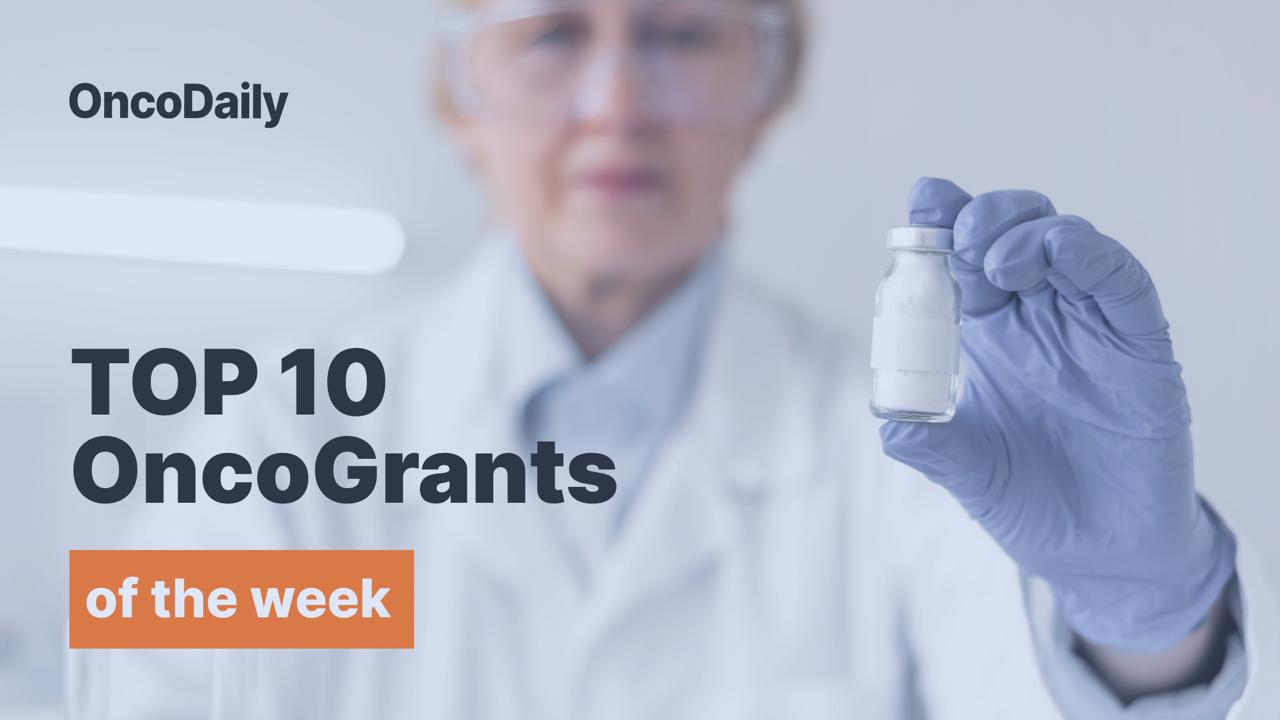This week, OncoDaily spotlights 10 major oncology grant and fellowship opportunities fueling innovation, equity, and global collaboration across cancer research and care.
From patient-centered bladder cancer research and pancreatic cancer biomarker discovery, to pediatric oncology breakthroughs, solid organ transplantation science, and programs empowering underrepresented trainees, these initiatives span the full spectrum of the oncology ecosystem.
Covering translational research, clinical innovation, technology development, and workforce training, these opportunities are designed to empower investigators, expand trial capacity, and accelerate the journey from discovery to patient impact. Together, they reflect a powerful momentum toward more equitable, data-driven, and transformative cancer care worldwide.
1.Bladder Cancer Advocacy Network Patient-Centered Clinical Research Award
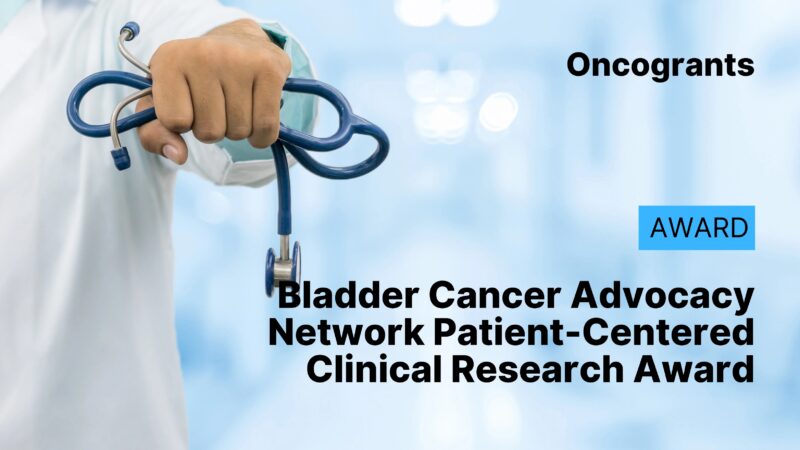
The BCAN Patient-Centered Clinical Research Award supports investigators launching or expanding careers in patient-centered clinical research focused on bladder cancer or upper tract urothelial carcinoma. Projects should emphasize improving patient experiences, outcomes, and equity in care delivery, addressing topics such as shared decision-making, access to care, survivorship, and quality of life.
Eligibility criteria:
-
Applicants must hold a doctoral degree (MD, DO, PhD, DNP, etc.) and a full-time faculty appointment (assistant professor or higher) at a U.S. or Canadian academic, nonprofit, or governmental institution.
-
Applicants must dedicate at least 30% of full-time effort to research.
-
A primary Co-Investigator with expertise in patient-centered clinical research is required.
-
Applicants must not have received an NIH R01 or equivalent in patient-centered clinical research but may have prior awards in other research areas.
-
Only one proposal per applicant per cycle; no concurrent BCAN awards allowed.
Funding details:
-
Total funding: 250,000 USD over 3 years.
-
Support limited to 20% of PI salary (up to 50,000 USD total).
-
Up to 7% indirect costs allowed.
-
Funds may cover personnel, research supplies, travel, and patient engagement activities.
-
Annual progress reports required; continued funding contingent on satisfactory progress.
-
Award recipients must attend and present at the 2029 BCAN Think Tank Meeting.
Deadline:
-
Application due: December 2, 2025, at 5:00 p.m. Eastern Time.
-
Award decision: March 2026.
-
Earliest grant start date: April 1, 2026.
Where to go for further information:
- Applications must be submitted via ProposalCentral.
- Questions about guidelines or eligibility: Rebecca Johnson (rjohnson@bcan.org) or Anne Collins (acollins@bcan.org).
2. PanCAN Precision Promise Biospecimen & Data Request Proposals
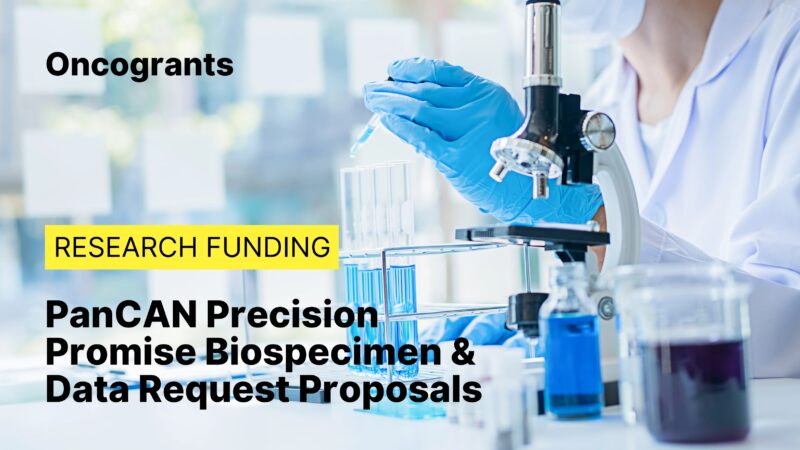
The Pancreatic Cancer Action Network (PanCAN) invites applications for the 2025 Precision Promise Biospecimen and Data Request Proposals. This opportunity provides access to clinical data, tumor samples, and research blood samples collected from participants in the Precision Promise adaptive clinical trial platform to advance translational pancreatic cancer research.
Eligibility criteria:
-
Applicants must be affiliated with the PanCAN Precision Promise adaptive clinical trial platform.
-
Research must have direct applicability to pancreatic cancer.
-
Eligible applicants include academic and industry partners with the necessary expertise and institutional oversight.
Funding details:
-
Catalyst Awards available for innovative projects with potential to impact clinical practice and patient outcomes.
-
Typical award: approximately 300,000 USD for up to 2 years.
-
Funding supports studies validating biomarkers, discovering treatment determinants, or generating novel data.
-
Resources include biospecimens (tumor, serum, plasma) and associated clinical/biomarker data.
Deadline:
-
Application deadline: November 3, 2025, at 9:00 a.m. PT / 12:00 p.m. ET.
-
Decisions announced: late December 2025 to early January 2026.
Where to go for further information:
- Applications must be submitted via ProposalCentral.
Questions: grants@pancan.org.
3. St. Baldrick’s Foundation Research Grant Award
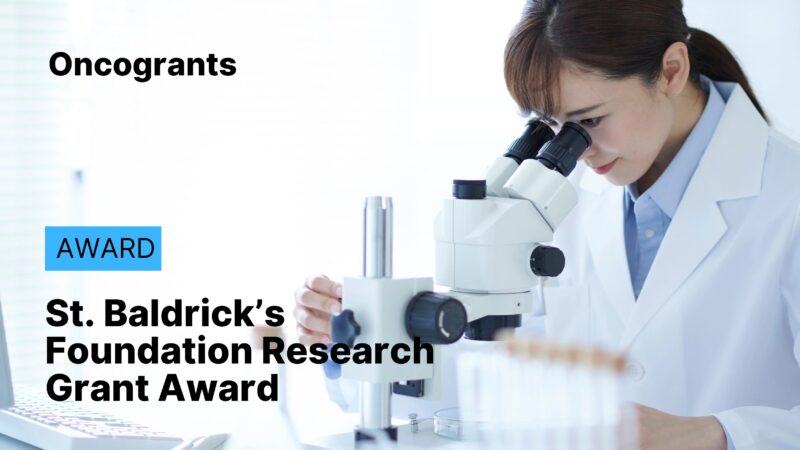
The St. Baldrick’s Foundation Research Grant supports hypothesis-driven laboratory, clinical, or epidemiological studies that advance understanding and treatment of childhood cancers. The program funds impactful pediatric oncology research in the United States, emphasizing innovation and collaboration across discovery, translational, and clinical research.
Eligibility criteria:
- MD/DO/PhD by start date; based at a U.S. academic/medical/nonprofit institution.
-
Project must directly relate to childhood cancer.
-
One LOI per institution per category (extra allowed for select tumor focuses).
Funding details:
-
Up to $100,000/year for 2 years (max $200,000).
-
No indirect costs.
Deadline:
-
Letter of Intent (LOI) due: December 8, 2025, 5:00 PM ET.
-
Full proposal due: February 27, 2026, 5:00 PM ET.
-
Award decisions announced: June 26, 2026.
-
Award period begins: July 1, 2026.
Where to go for further information:
- Apply via ProposalCentral.
- Questions: Grants@StBaldricks.org.
4. AST Research Network Fellowship Research Grant
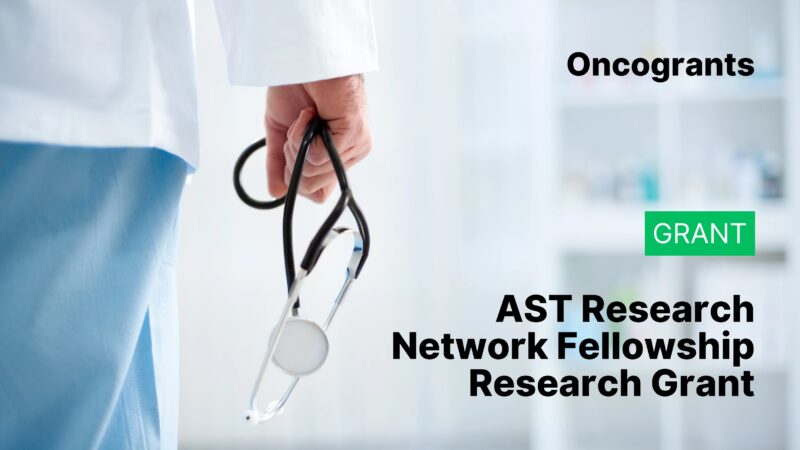
The American Society of Transplantation (AST) Research Network Fellowship Research Grant supports early-career researchers (within two years of postdoctoral training) pursuing studies in solid organ transplantation and related immunology. The grant aims to foster the development of future leaders in transplant science by providing a strong research training foundation.
Eligibility criteria:
-
Applicants must hold an MD, PhD, PharmD, DVM, or equivalent degree.
-
Must be within the first two years of postdoctoral research training (not including clinical training) by December 1, 2025.
-
Applicants must be in a fellowship training position (not faculty or senior staff).
-
Research must focus on solid organ transplantation.
-
A sponsor (mentor) is required, who must be an active AST member or have applied for membership by the deadline.
-
Research must be conducted in a North American setting.
-
Citizenship: open to U.S., Canadian, or Mexican citizens, permanent residents, or foreign nationals lawfully residing in these countries.
-
Fellows holding other fellowship or career development awards that fund salary are ineligible.
Funding details:
-
Amount: 75,000 USD for one year.
-
Start date: July 1, 2026 (cannot be deferred).
-
Supports recipient’s salary and/or research costs; overhead, capital equipment, and travel are not covered.
-
Payment made to the institution in annual installments.
-
Requires 50% protected research time (basic/translational) or 25% (clinical).
-
Recipients must submit mid-year and final reports; sponsor letters required.
-
Acknowledgment in publications: “This work was supported by a grant from the American Society of Transplantation Research Network.”
Deadline:
-
Application deadline: December 1, 2025, at 11:59 p.m. PST.
-
Notification of results: March 2026.
-
Recipients recognized at the American Transplant Congress (June 20–24, 2026, in Boston, MA).
Where to go for further information:
- Visit here to apply.
- Questions: research@myAST.org
5. AST Research Network Early Faculty Development Research Grant
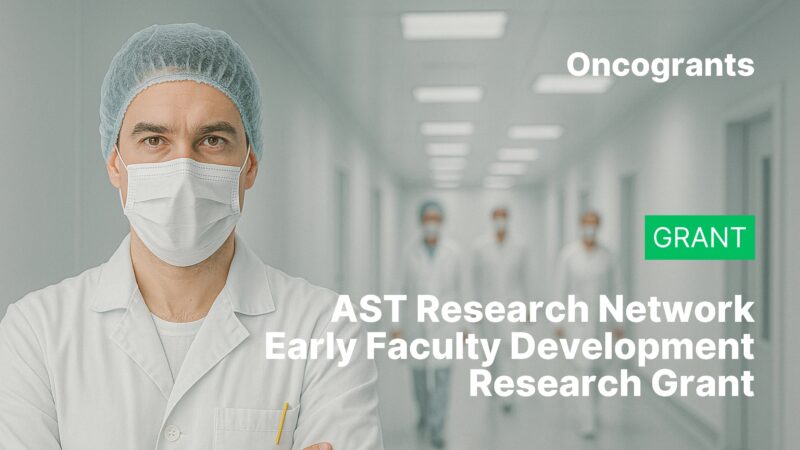
The American Society of Transplantation (AST) Research Network Early Faculty Development Research Grant supports investigators within five years of their first faculty appointment conducting research in solid organ transplantation or related immunology. This program helps early-career faculty expand on preliminary findings to build a foundation for independent NIH, VA, or equivalent career development awards.
Eligibility criteria:
-
Applicants must hold an MD, PhD, PharmD, DVM, or equivalent degree.
-
Must have a faculty appointment at an accredited North American institution and be within five years of their initial faculty appointment by December 1, 2025.
-
Must have institutional support and adequate resources to conduct research.
-
Protected research time required: minimum 50% for basic/translational projects and 25% for clinical projects.
-
AST membership required (active or pending by application deadline).
-
Research must be conducted in a North American setting.
-
Citizenship: open to U.S., Canadian, or Mexican citizens, permanent residents, or foreign nationals lawfully residing in those countries during the award term.
-
Ineligible if holding or having held NIH R01, R21, VA Merit, or comparable independent awards.
-
Cannot hold more than one AST grant concurrently; previous fellowship recipients may apply.
Funding details:
-
Amount: 75,000 USD for one year.
-
Research must begin July 1, 2026 (cannot be deferred).
-
Funds may be used for salary and/or research costs. Institutional overhead, capital equipment, and travel are not covered.
-
Paid in annual installments to the recipient’s institution.
-
Requires mid-term and final reports; failure to report may affect future funding.
-
Acknowledgment required in all publications: “This work was supported by a grant from the American Society of Transplantation Research Network.”
Deadline:
-
Application deadline: December 1, 2025, at 11:59 p.m. PST.
-
Notification of results: March 2026.
-
Recipients recognized at the 2026 American Transplant Congress (June 20–24, Boston, MA).
Where to go for further information:
- Visit here to apply.
- Questions: research@myAST.org
6. AGA–Aman Armaan Ahmed Family SURF for Success Program
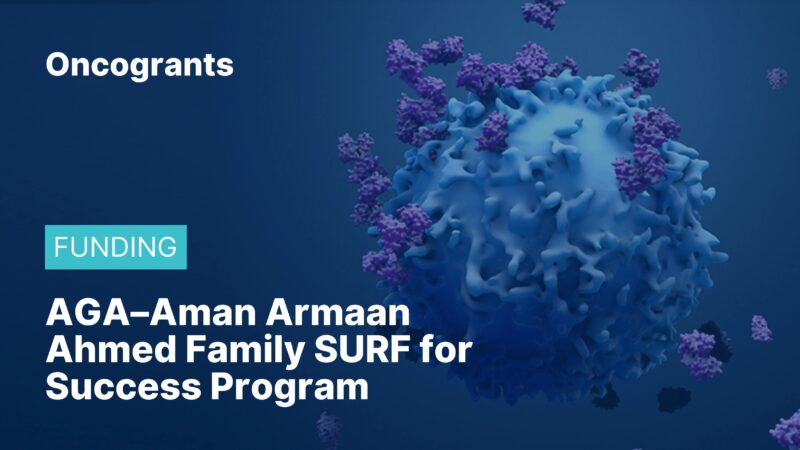
Ten-week summer undergraduate research fellowships supporting students from groups traditionally underrepresented in biomedical research to conduct mentored projects in digestive diseases (gastroenterology/hepatology). Provides a stipend, optional mentor lab support, and career-development opportunities. Active: accepting applications now.
Eligibility Criteria:
-
Enrolled in a North American undergraduate program leading to a bachelor’s degree and returning in the fall (no graduating seniors).
-
Identifies with a group traditionally underrepresented in biomedical research (e.g., specified racial/ethnic groups, individuals with disabilities, or from disadvantaged backgrounds as defined by the program).
-
Must secure an AGA-member research mentor (choose from participating mentors or your own AGA-member mentor).
-
May not hold a similar salary-support award (e.g., from American Liver Foundation, Crohn’s & Colitis Foundation, NIH).
-
Past recipients may reapply if reports/surveys were submitted and all criteria are still met.
Funding Details:
-
Stipend: USD 6,200 for the 10-week term.
-
Mentor lab support: up to USD 1,000 (with brief justification; optional).
-
Term: 10 weeks full-time; fellows secure their own housing.
-
Reporting: scientific progress report at completion; participation in follow-up surveys and alumni activities.
Deadline:
-
Application deadline: January 31, 2026.
-
Funding start date: May 21, 2026.
-
Timeline: Apps open October 2025; review Feb–Apr 2026; notifications April 2026; research May/June–Aug 2026; close-out September 2026.
Where to go for further information:
- Program details.
- Questions: awards@gastro.org
7. AGA–Dr. Harvey Young Education & Development Foundation Young Guts Scholars Program
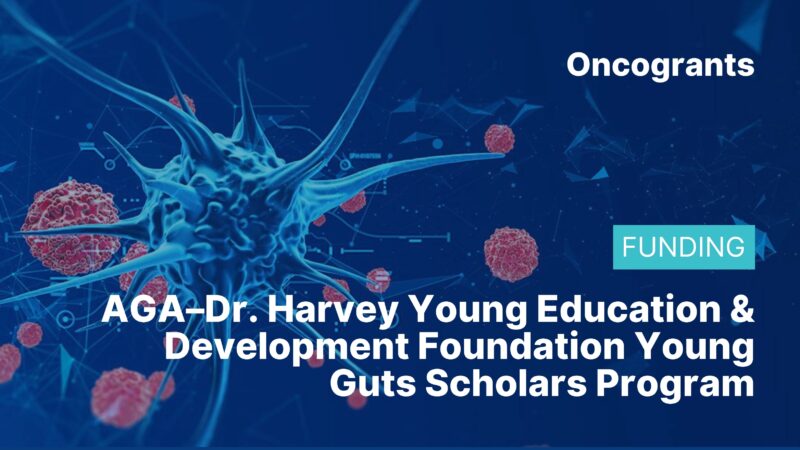
A 10-month, mentored academic-year research program supporting undergraduate students from groups traditionally underrepresented in biomedical research to conduct digestive disease research. Includes a stipend, AGA student membership, and travel support to attend Digestive Disease Week.
Eligibility Criteria:
-
Enrolled in a U.S. undergraduate program with at least one year remaining (no graduating seniors).
-
In good academic standing at an accredited institution.
-
Identifies with at least one eligible group (e.g., specified racial/ethnic groups, individuals with disabilities, or disadvantaged backgrounds as defined by the program).
-
Secured commitment from a research mentor who is a current, dues-paying AGA member (on- or off-campus; AGA can assist with mentor matching until January 16).
-
Minimum 12 hours/week of research throughout the academic year.
-
May not hold similar awards from other organizations; not intended for lab technician salary support.
-
Prior research experience is helpful but not required.
-
Past recipients may reapply if prior reporting requirements were met and eligibility remains.
Funding Details:
-
Stipend: 6,000 USD for the 10-month term (two installments during the 2026–2027 academic year).
-
AGA student membership for 3 years (75 USD value).
-
Travel allowance: up to 1,500 USD to attend Digestive Disease Week 2026 or 2027 (payable upon proof of registration).
-
Optional mentor lab support: up to 1,000 USD with brief justification.
-
Total package value typically ranges from 6,075 to 7,575 USD depending on travel and mentor-lab support utilization.
-
Reporting: scientific progress report at completion; participation in follow-up surveys and alumni activities; acknowledgment of the program in resulting outputs.
Deadline:
-
Application deadline: January 31, 2026.
-
Funding start date: August 14, 2026.
-
Timeline: Applications open October 2025; review May 2026; notifications June 2026; research August 2026–May 2027; DDW attendance May 2027; close-out July 2027.
Where to go for further information:
- Program details.
- Questions: awards@gastro.org
8. Urology Care Foundation and Chesapeake Urology Associates Clerkship Program
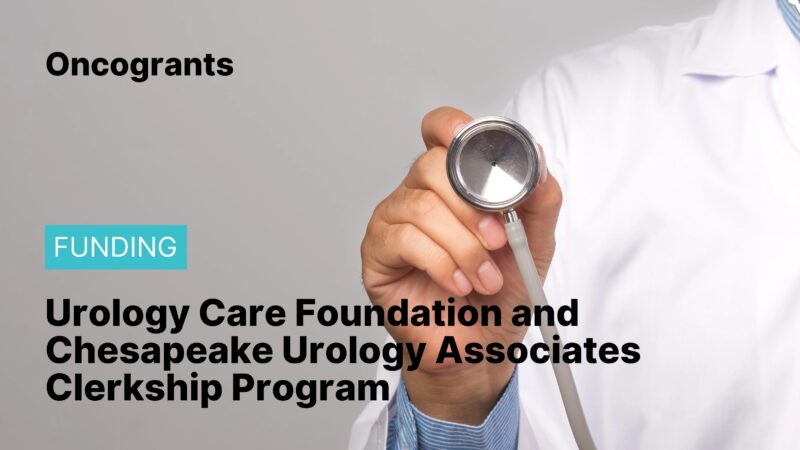
This four-week medical student clerkship, jointly offered by the Urology Care Foundation (UCF) and Chesapeake Urology Associates (CUA), provides hands-on clinical exposure and mentorship in prostate cancer care within a large independent community practice. The program integrates clinical training, didactic learning, and professional development to strengthen interest in urology and community-based cancer care.
Eligibility criteria:
-
Open to 2nd, 3rd, and 4th year medical students enrolled at accredited U.S. medical schools.
-
Preference for students studying or with family ties in Maryland, Delaware, Virginia, or Washington D.C.
-
Must demonstrate interest in urology and prostate cancer clinical care.
-
Must be available for a 4-week rotation at a Chesapeake Urology site and have reliable transportation.
-
Students without a home urology residency program or interested in healthcare disparities are encouraged to apply.
Funding details:
-
Two students will be selected as awardees each year.
-
Each receives a one-time $5,000 stipend to cover travel, accommodation, and participation expenses.
-
The rotation includes clinical shadowing, didactic lectures, multidisciplinary case discussions, and opportunities to attend AUA events (Annual Meeting, Advocacy Summit, or Policy Weekend).
-
Awardees will work directly with CUA mentors and develop short projects aligned with CUA and AUA strategic goals.
Deadline:
-
Deadline: November 17, 2025 (11:59 p.m. ET)
-
Notifications: December 22, 2025
-
Program start: January 2026 (schedule determined between preceptor and student)
Where to go for further information:
- Applications must be submitted via ProposalCentral.
- For inquiries, contact Jennifer Woods, Project Coordinator, Urology Care Foundation: grants@urologycarefoundation.org.
9. CRI Clinic and Laboratory Integration Program
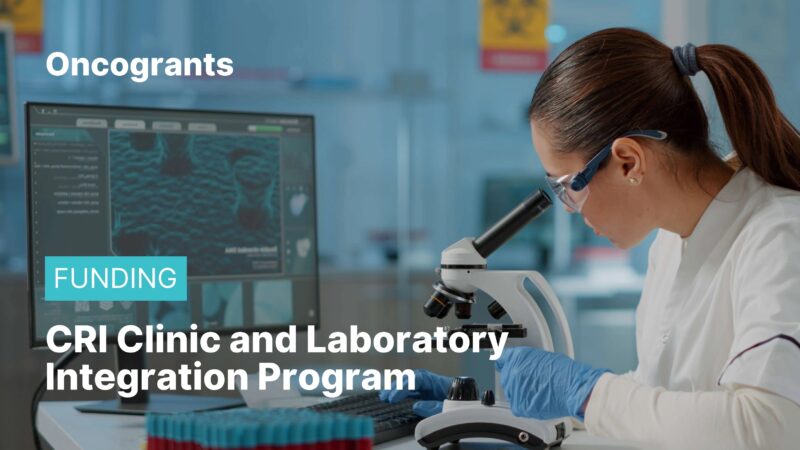
The Cancer Research Institute (CRI) Clinic and Laboratory Integration Program (CLIP) supports research bridging laboratory discovery and clinical application in cancer immunology. The program promotes translational studies that connect basic science insights with patient-centered therapeutic strategies to accelerate clinical impact.
Eligibility criteria:
-
Applicants must hold a faculty appointment (assistant professor or higher) by the award start date.
-
Research must be conducted at a nonprofit medical school or research center in the U.S. or abroad.
-
Only tenure-track or equivalent positions are eligible; adjunct/acting faculty are not.
-
CRI does not fund for-profit institutions.
-
LOI required before full application invitation.
Funding details:
-
Award: 300,000 USD over 2 years (150,000 USD per year).
-
Eligible for renewal with an additional 2-year, 300,000 USD extension based on performance.
-
Indirect costs: up to 10% (in addition to the total award).
-
Funds support research directly informing clinical practice, including preclinical modeling, biomarker discovery, resistance mechanisms, and therapeutic innovation.
-
Co-funding available for chordoma-focused studies in collaboration with the Chordoma Foundation.
Deadline:
-
Letter of Intent: December 1, 2025.
-
Full proposal (by invitation): March 2, 2026.
-
Award activation: July 1, 2026.
Where to go for further information:
- For questions: grants@cancerresearch.org
- Program information available at cancerresearch.org.
10. CRI Technology Impact Award
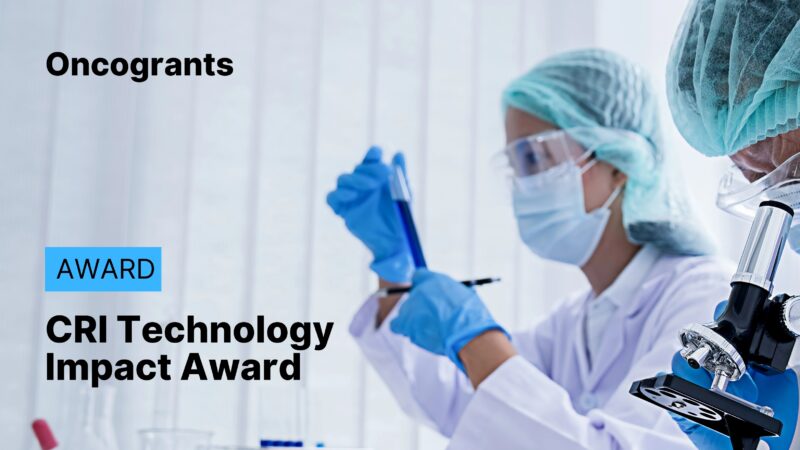
The Cancer Research Institute (CRI) Technology Impact Award supports early-stage, high-risk, high-reward technological innovations that have the potential to transform cancer immunotherapy. The program funds the development of new tools, platforms, and systems to address critical barriers in understanding and treating cancer through the immune system.
Eligibility criteria:
-
Applicants must hold a tenure-track position at a nonprofit research institution.
-
Co-Principal Investigators (Co-PIs) are allowed and encouraged.
-
Open to technology developers and clinical cancer immunologists; collaborative proposals are welcomed.
-
Research must focus on innovation in technology development applicable to cancer immunotherapy.
Funding details:
-
Amount: up to 600,000 USD total over 2–4 years.
-
Supports early conceptual and pre-development work (not continuation of existing technologies).
-
Indirect costs: up to 10% (in addition to the total award).
-
Clinical trials not supported, but use of samples from existing trials is permitted.
Deadline:
-
Letter of Intent: November 15, 2025.
-
Invited full proposal: March 2, 2026.
-
Earliest award start date: July 1, 2026.
Where to go for further information:
- Program details available at cancerresearch.org.
- Contact: grants@cancerresearch.org
If you want to learn more about Oncogrants, click here.


